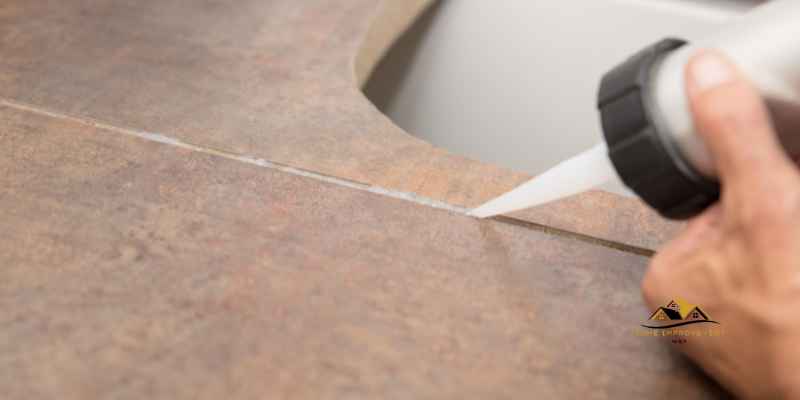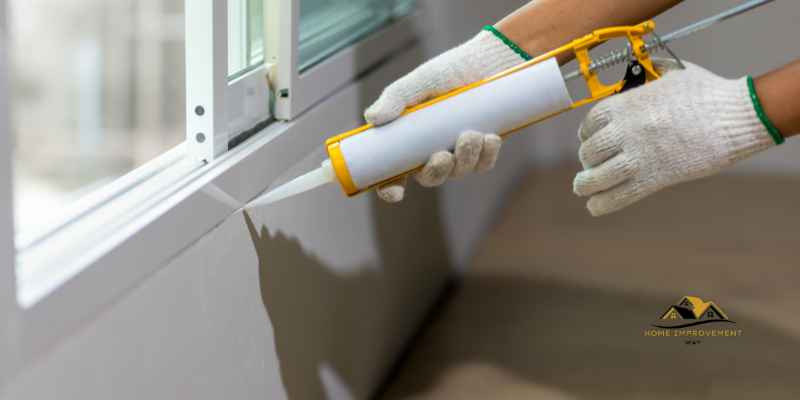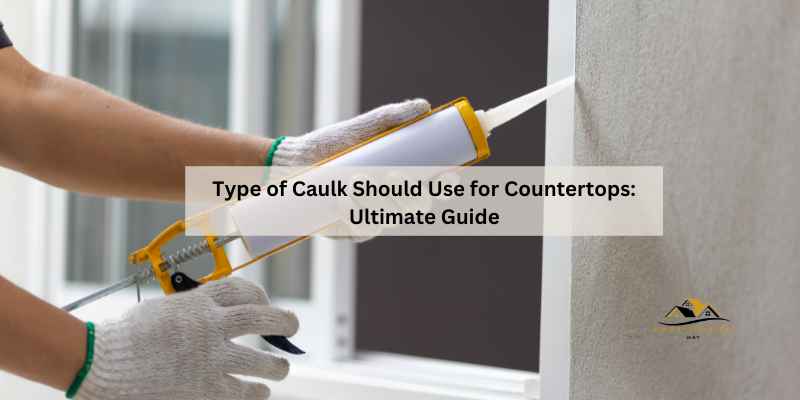The best type of caulk to use for countertops is silicone or silicone-blend caulks that are mold- and mildew-resistant and less affected by moisture and temperature changes. These are commonly used for kitchen and bath caulk projects, and they provide long-lasting and durable protection for your countertops.
When it comes to kitchen and bathroom countertops, caulking is an essential part of the installation process. It helps to protect against water damage and keeps your countertops looking clean and new. However, choosing the right type of caulk for your countertops can be confusing, with so many options available in the market.
We will guide you through the process of selecting the best type of caulk for your countertops. We will also cover the proper installation techniques to ensure that your caulk lasts for a long time and provides the protection your countertops need.
Understanding The Importance Of Using The Right Caulk
When it comes to installing or repairing countertops, choosing the right caulk is crucial. Using the wrong caulk can lead to a myriad of problems, including water damage, mold growth, and a compromised aesthetic. Understanding the importance of using the right caulk for countertops is essential for ensuring long-term durability and functionality. In this article, we will delve into the significance of choosing the right caulk and the potential issues that can arise from using the wrong one.
Why Choosing The Right Caulk Matters
Choosing the appropriate caulk for your countertops is vital for several reasons. Firstly, using the right caulk ensures a proper seal, preventing water and moisture from seeping into the countertop substrate. This is particularly important in kitchens and bathrooms, where countertops are frequently exposed to water and humidity.
Additionally, the right caulk contributes to the overall aesthetics of the countertops, providing a clean and seamless finish. The correct caulk also offers flexibility and durability, accommodating any movement or settling that may occur over time, thus preventing cracks or gaps from developing.
How Using The Wrong Caulk Can Cause Problems
Using the wrong caulk for your countertops can lead to a host of issues. Inadequate caulking can result in water infiltration, leading to damage not only to the countertop surface but also to the underlying structure. This can ultimately compromise the integrity of the entire countertop installation.
Moreover, incorrect caulking can detract from the visual appeal of the countertops, creating an unsightly and unprofessional finish. It can also lead to the growth of mold and mildew in damp environments, posing health risks and requiring costly remediation.
Types Of Caulk For Countertops
Silicone Caulk
Silicone caulk is a popular choice for countertops due to its flexibility and durability. It is resistant to moisture and heat, making it ideal for kitchens and bathrooms.
Epoxy Caulk
Epoxy caulk is a strong adhesive caulk that provides a permanent bond. It is commonly used for sealing countertops made of materials like granite and quartz.
Acrylic Caulk
Acrylic caulk is easy to apply and paintable, making it a versatile option for countertops. It is suitable for non-porous surfaces like laminate countertops.
Choosing The Best Caulk For Different Countertop Materials
Granite Countertops
For granite countertops, choose a high-quality silicone caulk that is mold and mildew resistant.
Quartz Countertops
When sealing quartz countertops, opt for a neutral-cure silicone caulk to prevent any chemical reactions with the quartz material.
Laminate Countertops
Laminate countertops require a latex caulk as it offers flexibility to accommodate any expansion and contraction of the laminate surface.
How To Apply Caulk Around Countertops
Properly applying caulk around countertops is crucial for maintaining a clean and polished look in your kitchen or bathroom. Choosing the right caulk and employing the correct application techniques will ensure a professional finish. Here are the essential steps and tips for achieving a seamless caulking job.
Preparation Steps
- Clean the countertop surface thoroughly to remove any dirt, grease, or old caulk using a mild detergent and water. Let it dry completely.
- Mask off the areas adjacent to the countertop with painter’s tape to protect them from excess caulk.
- Ensure the caulk and the surrounding area are at room temperature for optimal application.
Application Techniques
- Cut the tip of the caulk tube at a 45-degree angle to achieve the desired bead size and precision.
- Apply a continuous bead of caulk along the joint between the countertop and backsplash or wall, using a caulk gun for even distribution.
- Smooth the caulk line with a damp finger or a caulk finishing tool to create a neat and seamless finish.
- Remove the painter’s tape immediately after applying the caulk to prevent it from drying onto the surface.
Tips For A Professional Finish
- Choose a high-quality silicone or acrylic caulk specifically designed for kitchen and bathroom environments for better moisture and temperature resistance.
- Ensure the caulk matches the color of your countertop and backsplash to maintain a cohesive look.
- Work in small sections to prevent the caulk from skinning over before you can smooth it out.
- Regularly inspect and maintain the caulk to address any signs of wear or damage, ensuring a long-lasting seal.
Common Mistakes To Avoid When Caulking Countertops

Caulking countertops is a crucial step in ensuring the durability and longevity of your kitchen or bathroom surfaces. However, certain mistakes can compromise the effectiveness of the caulk, leading to potential issues down the line. To ensure a successful caulking job, it’s important to steer clear of these common pitfalls.
Using The Wrong Type Of Caulk
Choosing the correct type of caulk for your countertops is paramount. Using a non-suitable caulk can lead to issues such as discoloration, cracking, or even mold growth. It’s essential to use a silicone-based caulk specifically designed for use in areas prone to moisture and frequent cleaning, such as kitchens and bathrooms. This type of caulk offers superior water-resistance and flexibility, ensuring it can withstand the demands of countertop use.
Not Preparing The Surface Properly
Failure to adequately prepare the surface before applying caulk can result in poor adhesion and an unsightly finish. To ensure a successful bond, it’s crucial to thoroughly clean and dry the countertop surface. Any residue, grease, or moisture left on the surface can prevent the caulk from adhering properly, leading to potential leaks or detachment over time.
Overlooking Proper Application Techniques
Proper application techniques are essential for achieving a professional-looking and effective caulk seal. It’s important to apply the caulk in a continuous bead along the joint, ensuring there are no gaps or breaks in the seal. Additionally, smoothing the caulk with a damp finger or tool can help create a neat finish and improve its adhesion. Overlooking these techniques can result in an uneven and less durable caulk seal.
Best Practices For Sealing Countertops With Caulk
When it comes to sealing countertops with caulk, it is important to use the right type of caulk. For countertops, silicone and silicone-blend caulks are most commonly used as they are less affected by moisture and temperature changes and have additives to make them mold and mildew-resistant.
Ensuring Long-lasting Results
When it comes to sealing countertops with caulk, ensuring long-lasting results is crucial. Selecting the right type of caulk is essential for maintaining the integrity of the seal over time. Silicone-based caulks are highly recommended for their durability and resistance to moisture and temperature changes. Prior to application, it’s important to thoroughly clean and dry the surface to ensure optimal adhesion.
Preventing Mold And Mildew Growth
Preventing mold and mildew growth is a key consideration when sealing countertops with caulk. Mold-resistant caulks are specifically formulated to inhibit the growth of mold and mildew, making them ideal for use in kitchens and bathrooms where moisture levels are higher. Additionally, regular maintenance and cleaning of the caulked areas can help prevent the accumulation of moisture and debris, further reducing the risk of mold and mildew formation.
Caulking Specific Areas In The Kitchen And Bathroom
To properly caulk around countertops in the kitchen and bathroom, it is important to use the right type of caulk. For countertops, it is recommended to use silicone or silicone-blend caulks that are mold and mildew-resistant and less affected by moisture and temperature changes.
Around The Kitchen Sink
For the area around your kitchen sink, it is crucial to use a waterproof caulk that can withstand moisture and frequent cleaning.
Between Backsplash And Countertop
When caulking between the backsplash and countertop, opt for a flexible caulk that can expand and contract with temperature changes.
Around The Bathroom Sink
Bathroom sinks require a mold-resistant caulk to prevent mildew and mold growth in damp environments.
Conclusion And Recommendations
For countertops, use silicone or silicone-blend caulk in kitchens and baths for moisture and mold resistance. Choose a high-quality caulk like Loctite for durable and long-lasting results. Make sure to seal countertops properly with the right type of caulk for lasting protection.
Summary Of Key Points
Choosing the right caulk for countertops is crucial for a durable and aesthetically pleasing finish. It is essential to consider factors such as moisture resistance, flexibility, and adhesion when selecting a caulk for your countertops.
Recommended Caulk Brands For Countertops
- Loctite: Offers a premium range of countertop caulks known for their durability and long-lasting seal.
- DAP: Known for its high-quality silicone and acrylic-based caulks that provide excellent adhesion and flexibility.
- GE Sealants: Provides a variety of caulks specifically designed for kitchen and bathroom countertops, ensuring superior moisture resistance.
- Sashco: Offers specialized caulks for different countertop materials, delivering exceptional performance and durability.

Frequently Asked Questions
What Kind Of Caulk Do You Use For Countertops?
For countertops, use silicone or silicone-blend caulk for moisture and mold resistance. Silicone caulks are ideal for kitchens and bathrooms.
What Do You Use To Seal Countertops?
To seal countertops, use silicone or silicone-blend caulks designed for kitchen and bath projects. These caulks are resistant to moisture and temperature changes and are commonly used for sealing countertops. Silicone sealants are also suitable for granite countertops.
What Type Of Caulk To Use In The Kitchen?
For kitchen caulk, use silicone or silicone-blend caulks for damp areas like kitchens and baths. These are less affected by moisture and temperature changes, and often have mold- and mildew-resistant additives. Silicone is commonly used for kitchen and bath caulking projects.
What Is The Best Silicone Caulk For Granite Countertops?
The best silicone caulk for granite countertops is a high-quality, mold-resistant, and durable silicone sealant. It provides a strong and long-lasting bond, perfect for sealing and protecting granite surfaces.
Conclusion
When sealing your countertops, opt for silicone or silicone-blend caulk for durability and resistance to moisture. Choosing the right caulk is crucial for maintaining a long-lasting finish. Ensure a smooth application for a professional look that enhances your kitchen or bathroom space.
Make your countertops shine!


